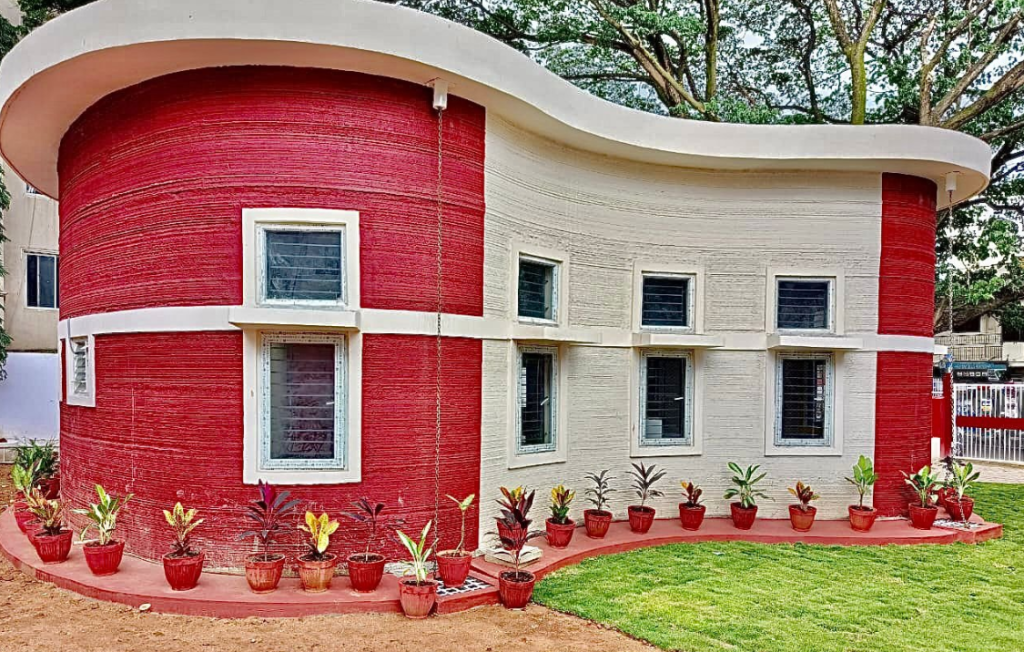Construction company Larsen & Toubro (L&T) and the Indian Institute of Technology Madras (IIT Madras) have developed India’s first-ever 3D printed post office located in Bengaluru’s Cambridge Layout.
Ashwini Vaishnaw, the Union Cabinet Minister for Railways, Communications, Electronics and IT, played a role in the virtual inauguration held at the General Post Office building. Completed in just 43 days, finishing two days ahead of schedule, this accomplishment underscores the potential of 3D concrete printing technology to bring about significant changes in construction methods, says the company.
“Bengaluru always presents a new picture of India. The new picture that you saw today in terms of this 3D printed post office building, that’s the spirit of India today. That’s the spirit with which our country is progressing today,” the Union Minister told The Indian Express.
A cost-effective and sustainably developed 3D printed post office
Spanning an area of 1,021 square feet, the post office stands as a “testament to modern engineering,” says the company. The construction process involves a methodical placement of concrete layers by a robotic 3D printer, following a pre-approved design. The incorporation of specialized concrete, which solidifies rapidly, ensures a strong bond between these layers, resulting in a cohesive structure. Notably, the 3D printed post office boasts a seamless structure with no vertical joints. The technology’s flexibility allowed for curved surfaces and adaptation to various dimensions, eliminating the limitations of traditional flat walls. The method enabled continuous reinforced concrete footing and three-layer walls with inner reinforcement.
George Abraham, Head of Operations (south and east) at L&T, highlighted the project’s efficiency owing to robotic intervention and pre-embedded designs. This novel approach drastically reduced the construction timeline from the usual 6-8 months to a mere 43 days, “setting a new benchmark in speed and efficiency.” Additionally, the 3D printed method incurred a cost of Rs 23 lakh ($27,840), marking a 30-40% reduction in expenses compared to conventional construction.
The project’s developers emphasized the potential of 3D printing to transform construction, offering customized structures, weatherproofing, and integrated utilities within walls for enhanced efficiency. Rajendra Kumar, Chief Postmaster General of Karnataka Postal Circle, revealed plans to replicate the technology across 400 vacant sites in the state, potentially triggering interest in low-cost housing solutions.

How 3D printing is changing the way of construction
Hyderabad-based construction company Apsuja Infratech collaborated with Mumbai’s Simpliforge Creations to construct the world’s first 3D printed temple in Siddipet. The elaborate temple, spanning 3,800 sq. ft. and reaching a height of 30 ft., showcased a tripartite design. This novel construction approach aimed to halve the typical construction timeline, with completion projected within 2-3 months. Simpliforge’s state-of-the-art robotic 3D printing facility, the largest in South Asia, as said by the company, led the 3D printing process using in-house technology, software, and materials. The temple’s three sanctums, dedicated to various deities, comprised a Ganesha modak, a Shivalay (Shrine) for Lord Shankar, and a lotus chamber for Goddess Parvati, with ongoing construction on spires and chambers.
Danish 3DCP Group and humanitarian foundation Team4UA successfully constructed Europe’s debut 3D printed school in Lviv, Ukraine. This project was carried out by utilizing COBOD‘s BOD2 3D printer. The single-floor school, covering 370 m2, was designed to create a nurturing environment for young students, particularly those affected by the impacts of war. To showcase the 3D printed construction, the architect excluded COBOD’s flaps technology, resulting in smooth walls. Notably, 90% of the construction materials were sourced locally, bolstering the community and its economy.
What does the future of 3D printing for the next ten years hold?
What engineering challenges will need to be tackled in the additive manufacturing sector in the coming decade?
To stay up to date with the latest 3D printing news, don’t forget to subscribe to the 3D Printing Industry newsletter or follow us on Twitter, or like our page on Facebook.
While you’re here, why not subscribe to our Youtube channel? Featuring discussion, debriefs, video shorts, and webinar replays.
Are you looking for a job in the additive manufacturing industry? Visit 3D Printing Jobs for a selection of roles in the industry.



